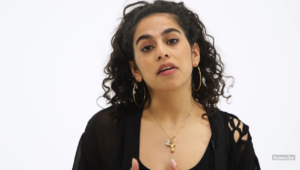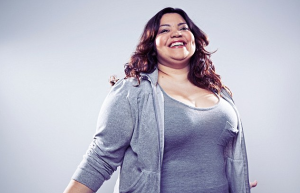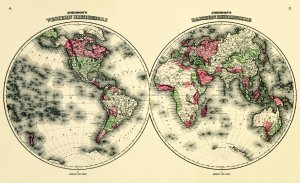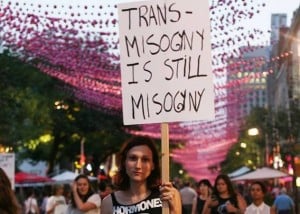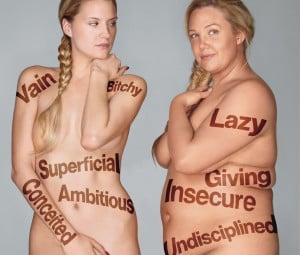
Two smiling friends embrace each other.
give an mc without integrity a mic
and s/he will rhyme the death of the people
—d’bi young anitafrika
When I first came into activist culture, I was a runaway queer kid searching for a home: a terrified, angry, suspicious, cynical-yet-naïve teenager whose greatest secret desire was for a family that would last forever and love me no matter what.
Yet I also knew that such a family could never exist – at least not for me.
You see, I had another secret: Underneath all of my radical queer social justice punk bravado, I knew that I was trash. I was dirty and unlovable. I had done bad things to survive, and I had hurt people. Sometimes I didn’t know why.
So when I found activist culture, with its powerful ideas about privilege and oppression and its simmering, explosive rage, I was intoxicated. I thought that I could purge my self-hatred with that fiery rhetoric and create the family I wanted so much with the bond that comes from shared trauma.
Social justice was a set of rules that could finally put the world into an order that made sense to me. If I could only use all the right language, do enough direct action, be critical enough of the systems around me, then I could finally be a good person.
All around me, it felt like my activist community was doing the same thing – throwing ourselves into “the revolution,” exhausting ourselves and burning out, watching each other for oppressive thoughts and behavior and calling each other on it vociferously.
Occasionally – rarely – folks were driven out of community for being “fucked up.” More often, though, attempts to hold people accountable through call-outs and exclusion just exploded into huge online flame wars and IRL drama that left deep rifts in community for years. Only the most vulnerable – folks without large friend groups and social stability – were excluded permanently.
Like my blood family, my activist family was re-enacting the trauma that we had experienced at the hands of an oppressive society.
Just as my father once held open the door to our house and demanded that I leave because he didn’t know how to reconcile his love for me with my gender identity, we denounced each other and burned bridges because we didn’t know how reconcile our social ideals with the fact that our loved ones don’t always live up to them.
I believe that sometimes we did this hypocritically – that we created the so-called call-out culture (a culture of toxic confrontation and shaming people for oppressive behavior that is more about the performance of righteousness than the actual pursuit of justice) in part so that we could focus on the failings of others and avoid examining the complicity with oppression, the capacity to abuse, that exists within us all.
And I believe we did it in part because sometimes it’s impossible to imagine any other way: We live in a disposability culture – a society based on consumption, fear, and destruction – where we’re taught that the only way to respond when people hurt us is to hurt them back or get rid of them.
This article comes out of that queer kid’s longing for forever-family, and from countless conversations with other members of social justice communities longing for the same. It comes out of my own fuck-ups having been generously forgiven by others, and from my effort to forgive those who have harmed me.
It comes from a desire I feel all around me for an alternative to the politics of disposability, for a politics of indispensability instead.
“Indispensability politics” isn’t a term I’ve coined personally. It has existed various communities for some time, and I learned it orally, though I cannot find a written source. But the following principles are ideas – suggestions for a foundation on which indispensability culture in leftist activism might be built. They are a work permanently in progress.
They’re not meant to be a new set of rules for activism. Nor are they a step-by-step guide for holding accountability processes or a complete answer to the questions that I’m raising around.
Still, I hope that they are helpful to you.
1. The Revolution Is a Relationship
sometimes
we want to close our eyes
jack off to pictures of radical disneyland
not watch as we gnaw our own
flesh into meat
—Leah Lakshmi Piepzna-Samarasinha, “so what the fuck does conscious mean anyway”
Something that worries me about social justice communities is that we tend to conceptualize “revolution” as a product, as a place and time that we expend all of our energy and anger to create – often without regard to the toll this takes on individuals and our relationships.
In this way, “The Revolution” occupies a position in activist culture that actually reminds me of the role that Heaven played in the Chinese Christian community I grew up in: It is a fantasy of ideological purity against which our actions are judged, a place that we long to live in, but seems impossible to reach.
In our – often justified – anger and disappointment at the failure of ourselves and our communities to uphold the dream of revolution, we lash out.
We try to cleanse ourselves of the pain of betrayal by cutting off and driving out the betrayers – our abusive families, our conservative friends. We try not to look at the betrayer in the mirror.
What if revolution isn’t a product, some distant promised land, but the relationships that we have right now?
What if revolution is, in addition to – not instead of – direct action and community organizing, the process of rupture and repair that happens when we fuck up and hold each other accountable and forgive?
2. The Oppressor Lives Within
The most important political struggle I will ever have is against the oppressor – the racist, transmisogynist, ableist, abusive person – in myself.
I don’t mean to say this in a self-flagellating, self-blaming way. I’ve experienced oppression, violence, rape, and abuse from others, and this is not my fault.
I mean that I’ve started to believe that I can’t engage in authentic activism, I can’t create positive change without recognizing and naming my own participation in the oppressive systems that I’m trying to undo.
Coming from this position, I’m forced to have compassion for the people around me who I see also participating in oppression, even as I’m also angry at them. With compassion comes understanding, and with understanding comes belief in the possibility of change.
When we become capable of holding that contradiction in our hearts – when we can be angry and compassionate at the same time, at ourselves as well as others – entirely new possibilities for healing and transformation emerge.
3. Accountability Starts in the Heart
Too often, I’ve seen accountability processes in social justice communities devolve into vicious “your word against mine” situations and social power plays in which people accuse each other of harm and abuse.
As witnesses to these situations, we become trapped, caught in the double bind of either having to pick a side or doing nothing. Both options carry the risk of becoming complicit in the harm being done, and the “truth” becomes impossibly blurred.
I often wonder how different things would look if it were more of a cultural norm to understand accountability as a practice that comes from within the individual, instead of a consequence that must be forced onto someone externally.
What if we taught each other to honor the responsibility that comes with holding ourselves accountable, rather than seeing self-accountability as a shameful admission of guilt? What if we could have real conversations with each other about harm, in good faith?
In a culture of indispensability, I cannot ignore someone when they tell me I have harmed them – they are precious to me, and I have to try to understand and respond accordingly.
To become indispensable to one another, we must also be willing to be responsible for and accountable to one another.
4. Perpetrator/Survivor is a False Dichotomy
There is an intense moral dynamic in social justice culture that tends to separate people into binaries of “right” and “wrong.”
To be a perpetrator of oppression or violence is highly stigmatized, while survivorhood may be oddly fetishized in ways that objectify and intensify stories of trauma.
“Perpetrators” are considered evil and unforgivable, while “survivors” are good and pure, yet denied agency to define themselves.
Among the many problems of this dynamic is the fact that it obscures the complex reality that many people are both survivors and perpetrators of violence (though violence, of course, exists within a wide spectrum of behaviors).
Within a culture of disposability – whether it be the criminal justice system of the state or community practices of exiling people – the perpetrator/survivor dichotomy is useful because it appears to make things easier. It helps us make decisions about who to punish and who to pity.
But punishment and pity have very little to do with revolutionary change or relationship-building.
What punishment and pity have in common is that they’re both dehumanizing.
5. Punishment Isn’t Justice
Punishment is the foundation of the legal criminal justice system and of disposability culture. It’s the idea that wrongs can be made right by inflicting further harm against those who are deemed harmful.
Punishment is also, I believe, a traumatized response to being attacked, the intense expression of the “fight” reflex. Activist writer Sarah Schulman discusses this idea in detail in her book, Conflict Is Not Abuse.
It isn’t inherently wrong to want someone who hurt you to feel the same pain – to want retribution, or even revenge. But as Schulman also writes, punishment is rarely, if ever, actually an instrument of justice – it is most often an expression of power over those with less.
How often do we see the vastly wealthy or politically powerful punished for the enormous harms they do to marginalized communities? How often are marginalized individuals put in prison or killed for minor (or non-existent) offences?
As long as our conception of justice is based on the violent use of power, the powerful will remain unaccountable, while the powerless are scapegoated.
But even beyond this, a culture of disposability and punishment breeds fear and dishonesty.
How likely are we to hold ourselves accountable when we’re afraid that we’ll be exiled, imprisoned, or killed if we do? And how can we trust each other when we live in fear of one another?
We have to find another way to bring about justice.
6. Nuance Isn’t an Excuse for Harm
One of the most common responses I see to critiques of call-out culture and disposability is that perpetrators of violence and predators use these critiques to obscure their own wrongdoing and avoid accountability.
Furthermore, we, as communities, use the “complexity” and “nuance” of such critiques as excuses for not intervening when harm is being done.
But indispensability means that everyone – especially those have experienced harm – are precious and require justice. In other words, we cannot allow the fact that something is complicated or scary prevent us from trying to stop it.
Trapped in the perpetrator/survivor dichotomy of understanding harm, it might seem like we have only two options: to ignore harm or to punish perpetrators.
But in fact, there are often other strategies available.
They involve taking anyone’s – everyone’s – expressions of pain seriously enough to ask hard questions and have tough conversations. They involve dedicating time and resources to ensuring that anyone who has been harmed has the support they need to heal.
7. Healing Is Both Rage and Forgiveness
If the revolution is a relationship, then the revolution must include room for both rage and forgiveness: We have to be able to tolerate the inevitability that we will be angry at one another, will commit harm against one another.
When we are harmed, we must be allowed the space to rage. We need to be able to express the depth of our hurt, our hatred of those who hurt us and those who allowed it to happen – especially when those people are the ones we love.
It is up to the community to hold and contain this rage – to hear and validate and give it space, while also preventing it from creating further harm.
The expression of anger and pain is key to the transformation of violence into healing, because it allows us to understand what has happened and motivates us to change.
And it’s up to the community as well to then provide a framework for forgiveness, to help envision a future where forgiveness is possible, and how it might be achieved.
8. Community Is the Answer
There are no activist communities, only the desire for communities, or the convenient fiction of communities. A community is a material web that binds people together, for better and for worse, in interdependence…
If it is easier to kick someone out than to go through a difficult series of conversations with them, it is not a community. Among the societies that had real communities, exile was the most extreme sanction possible, tantamount to killing them. On many levels, losing the community and all the relationships it involved was the same as dying.
Let’s not kid ourselves: We don’t have communities.
—Anonymous, Broken Teapot Zine
The above quote is a revealing glance into the inner dynamics of social justice and activist culture.
It reveals the source of our incapacity to create accountability and the deep emotional and material insecurities that lie beneath it.
Perhaps the reason we tend to recreate disposability culture and trauma responses over and over is because we are all, secretly, that frightened runaway kid, constantly searching for a home, but not really believing we can find one.
Maybe we don’t create communities of true interdependence – of indispensability, of forever-family – because we are terrified of what will happen if we try.
But I believe, have to believe, that true community is possible for me and for all of us. The truth is, we can’t keep going on the way we have been. We need each other, need to find each other, in order to survive.
And I have faith that we can.
[do_widget id=’text-101′]
Kai Cheng Thom is a Contributing Writer for Everyday Feminism. She is a Chinese trans woman writer, poet, and performance artist based in Montreal. She also holds a Master’s degree in clinical social work, and is working toward creating accessible, politically-conscious mental healthcare for marginalized youth in her community. You can find out more about her work on her website and at Monster Academy.
Search our 3000+ articles!
Read our articles about:
Our online racial justice training
Used by hundreds of universities, non-profits, and businesses.
Click to learn more





